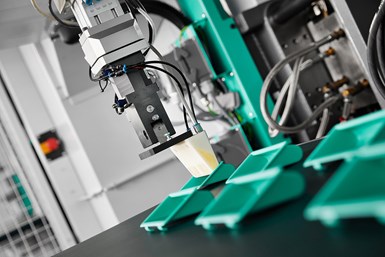Arburg Freeformer Covers Range of Industrial AM Applications
RAPID 2021: Arburg’s Freeformer 200-3X and 300-3X produce complex, functional parts.

Freeformer machines can produce customized grippers for robotic systems.
Arburg’s two Freeformer machines — Freeformer 200-3X and Freeformer 300-3X — can additively manufacture positive material bonds in hard/soft combinations and convert very soft original materials into fully functional parts, the company says. The machines use Arburg Plastic Freeforming (APF) to process original plastic granules in the production of these complex functional parts, which is said to make them well suited for the medical, OEM and automotive industries.
When developing new products, companies can use the APF process to produce items such as elastic hoses, axle boots and housing seals from original soft materials. For example, the Freeformer 200-3X can produce a typical automotive part in the engine compartment, manufacturing a hose from thermoplastic polyurethane Texin 770A (hardness 70 Shore A) and water-soluble support material for connection to an HVAC unit. It is said the dense and flexible TPU connector is resistant to chemicals, cold and abrasion. This means it can be used to its full extent for prototype vehicle function tests which can significantly accelerate time to market.
The machines also enable cost-effective, customized production in single-unit batches and upward on demand, the company says. For example, the Freeformer can manufacture customized assembly devices and grippers for robotic systems in single-unit batches and upward. A gripper of this type with a positive bond in hard/soft combination is used, for example, in Arburg's own plastic parts production for the automated removal of handles from Arburg’s temperature control units.
The APF process also offers a complementary production technology for manufacturing functional plastic parts, such as functional and resilient flip-top closures made of semi-crystalline PP and soft TPE. Products relevant to medical technology include resorbable implants made of FDA-approved original material and patient-specific tablets with variable density and filling content that deliver their active ingredients to the body in a targeted manner over a specific period of time. The machines can also manufacture high-temperature plastics such as sterilizable Ultem 1004 for medical technology and flame-retardant Ultem 9085 for aerospace.
Related Content
-
3D Printed Lattices Replace Foam for Customized Helmet Padding: The Cool Parts Show #62
“Digital materials” resulting from engineered flexible polymer structures made through additive manufacturing are tunable to the application and can be tailored to the head of the wearer.
-
What Does Additive Manufacturing Readiness Look Like?
The promise of distributed manufacturing is alluring, but to get there AM first needs to master scale production. GKN Additive’s Michigan facility illustrates what the journey might look like.
-
Copper, New Metal Printing Processes, Upgrades Based on Software and More from Formnext 2023: AM Radio #46
Formnext 2023 showed that additive manufacturing may be maturing, but it is certainly not stagnant. In this episode, we dive into observations around technology enhancements, new processes and materials, robots, sustainability and more trends from the show.











